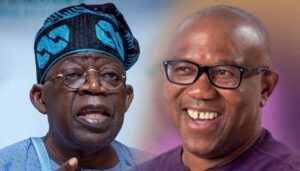By Okike Ezugwu
There is an extraordinary popular delusion pervading Nigeria’s civic ecosystem: many Nigerians tend to think that the economic hardship in Nigeria today would have been averted if Obi was declared president. For the optimists among this swelling number, life would become better for Nigerians if Obi is eventually elected president in 2027. This is mass delusion. Peter Obi’s philosophy of economic management is almost identical to Tinubu’s, and possibly more red-blooded. His policies, if he was elected president or is eventually elected president, would have as much harsh implications as Tinubu’s are having. And Obi, contrary to his meek mien, might be more insistent on his convictions.
I have taken time to listen to and to study Obi, a great man whom I offered my alloyed and enthusiastic support in the last election. During the vice-presidential debate in 2019, Obi was pitted against then Vice President Yemi Osinbajo. He was the usual rough-and-ready speaker, getting across his points with an awesome sprinkle of commonsense and charisma. Osinbajo was characteristically suave, gentlemanly, with his upper-class accent. It is one of the high moments of Nigeria’s public space. The moderator asked Obi what he thought of the subsidies. Obi was for yanking off of the subsidies. The moderator asked again how he planned tackling the blow black. Obi artfully parried the question, or at best offered a politically appropriate response. He would remarkably deplore subsidies as a long running drag on Nigeria’s economy.
 I need not tell you again that Obi was then a running mate to Atiku Abubakar, the buck-passer in-chief himself whose solution to every economic problem border on privatisation. Atiku (it could have been bad humor) once touted the idea of privatising Nigeria. Obi was the spokesperson of deregulation and free trade in that debate. Osinbajo, on his part, insisted that the subsidies should be retained. As if prescient, he predicted the outcome of any abrupt yanking off of subsidies. He said it would thrust Nigerians into a dire and insufferable economic crisis. He has been abundantly proven right.
I need not tell you again that Obi was then a running mate to Atiku Abubakar, the buck-passer in-chief himself whose solution to every economic problem border on privatisation. Atiku (it could have been bad humor) once touted the idea of privatising Nigeria. Obi was the spokesperson of deregulation and free trade in that debate. Osinbajo, on his part, insisted that the subsidies should be retained. As if prescient, he predicted the outcome of any abrupt yanking off of subsidies. He said it would thrust Nigerians into a dire and insufferable economic crisis. He has been abundantly proven right.
In the last election, the three major candidates – Tinubu, Atiku, Obi – sang from the same economic song sheet. Subsidy was the enemy, which the three went beyond their differences to identify. Obi, the most outspoken and ubiquitous of the candidates often addressed it with angry obsession. An instance he never got tired of citing was that of an oil importer pleading with the then president to remove subsidy, because they were making too much money from it. He would shrug in shocked horror each time he instanced it. For the advocates of a well-mixed economy with calculated, people-oriented state interventions, the uniformity of economic standpoint among the three hopefuls is worrisome.
You should agree with me that among the three, Obi’s strongest card is his reputation for probity and prudence. He might be able to compel some measure of accountability even though I find his idea of “forgiving” former looters particularly unfortunate. He might try in earnestness to strengthen the institutions which would plug loopholes and block the leeway that enable graft. Hindsight shows however that accountability goes beyond the president. Nigeria needs a major surgery in this respect as a body-whole. But you cannot underestimate the implication of a single influential forthright figure to whom accountability is a watchword.
Obi will bum-suck the North, it might be argued. This is another important difference between Tinubu and Obi. The costly subservience of the South is a trademark of Nigeria’s national politics. The North is understood as the organ grinder, holding all the aces. Not long ago, we had a president of Southern extraction who spent his entire time in office ingratiating himself to the North, overcarefully avoiding her thin-skin. Not even an extreme stretch of the imagination could make anybody consider me an irredentist, but our co-existence should not be based on the fear of political consequences, but on a delicate balance between equity and reasonableness. From what we call all see, Tinubu is rather brave heartedly putting out the pan-Nigerian stance, overhauling a sorry state of affairs in which government policies are first tested against ethnocentric sensibilities, always in crass disregard of commonsense. In this regard, the proposed tax reform bill jumps readily into focus.
The dis-similarities cease here. As I had hinted, Obi is perhaps a more thorough-going free market economist, if it could be so expressed. Throw Atiku into the mix and it is the same thing. It is one leprous hand, with two fingers missing.
Okike Ezugwu, a Lawyer, sent this piece from Enugu

